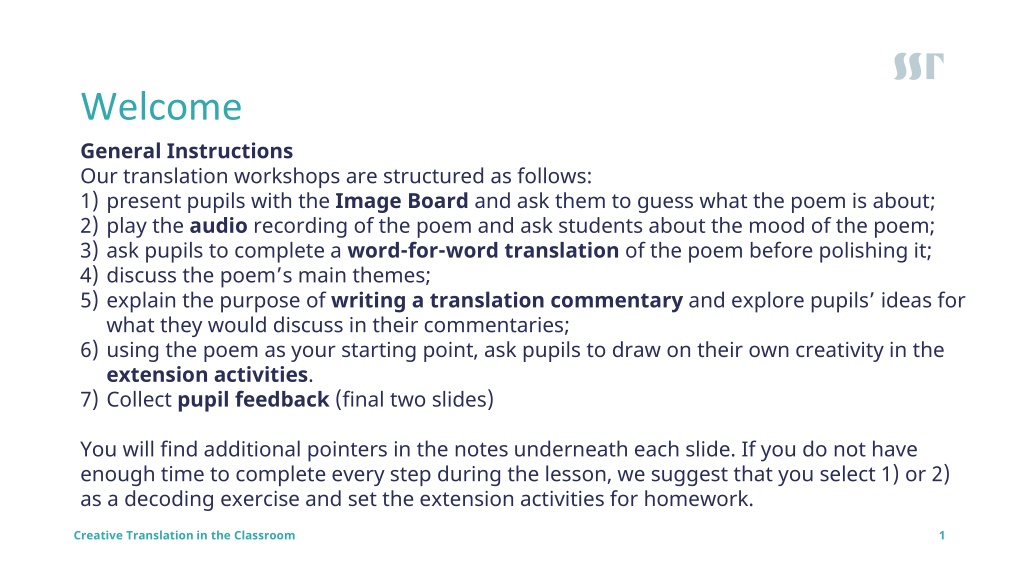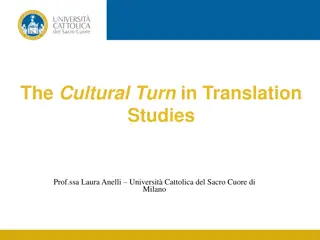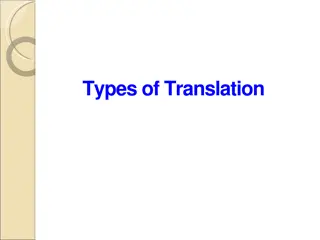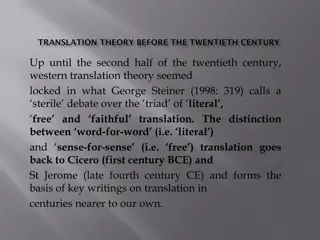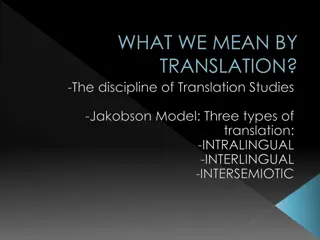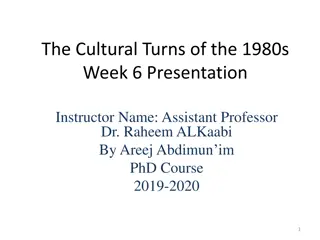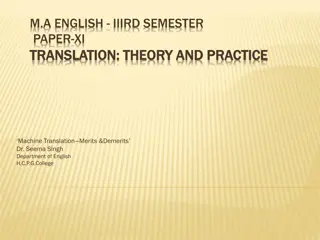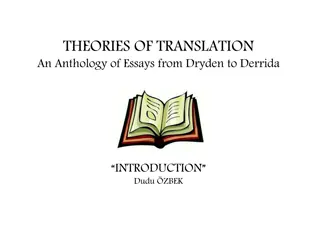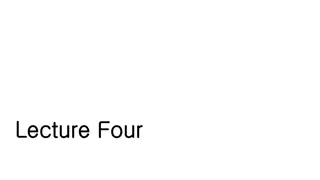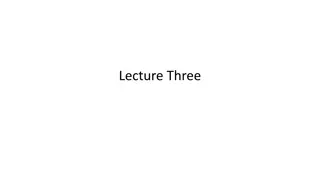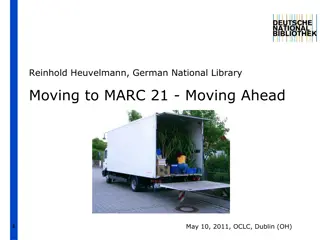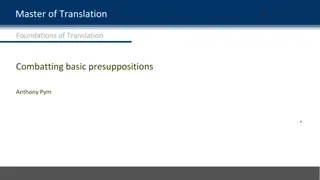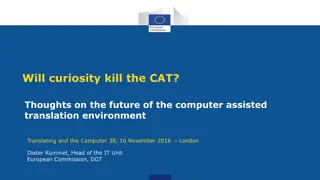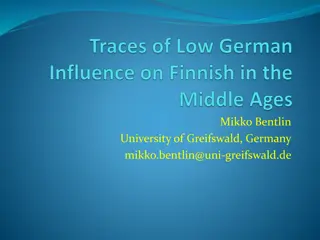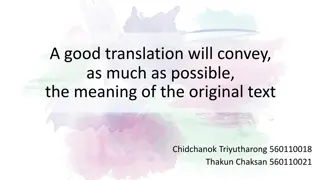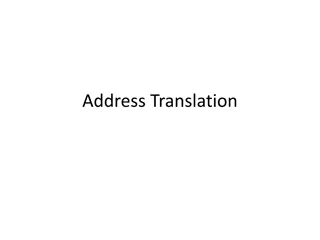Creative Translation Workshop for German Poem Analysis
Explore the structured approach of a translation workshop focusing on analyzing a German poem by Julia Engelmann. Dive into decoding the poem's message, discussing its themes, and encouraging creative extension activities. Enhance translation skills and understanding of poetic nuances through audio listening exercises and engaging discussions. Uncover the essence and mood of the poem to inspire thoughtful translations and reflections.
Download Presentation

Please find below an Image/Link to download the presentation.
The content on the website is provided AS IS for your information and personal use only. It may not be sold, licensed, or shared on other websites without obtaining consent from the author. Download presentation by click this link. If you encounter any issues during the download, it is possible that the publisher has removed the file from their server.
E N D
Presentation Transcript
Welcome General Instructions Our translation workshops are structured as follows: 1) present pupils with the Image Board and ask them to guess what the poem is about; 2) play the audio recording of the poem and ask students about the mood of the poem; 3) ask pupils to complete a word-for-word translation of the poem before polishing it; 4) discuss the poem s main themes; 5) explain the purpose of writing a translation commentary and explore pupils ideas for what they would discuss in their commentaries; 6) using the poem as your starting point, ask pupils to draw on their own creativity in the extension activities. 7) Collect pupil feedback (final two slides) You will find additional pointers in the notes underneath each slide. If you do not have enough time to complete every step during the lesson, we suggest that you select 1) or 2) as a decoding exercise and set the extension activities for homework. Creative Translation in the Classroom 1
Notes on One Day/Reckoning Text Julia Engelmann: - contemporary poet, musician, actress born in 1992 - One Day went viral in 2014 her video of her performance was viewed 5 million times in 2 weeks (a lot at that time) - has won a lot of poetry slam contests - has written 7 bestselling poetry books One Day/Reckoning Text: - samples lyrics from a pop song her chorus is a direct translation of the chorus of this song - is about seizing the day, living in the moment and making the most of life - uses a lot of abbreviations almost every instance of first person is abbreviated - use of Konjunktiv II, e.g. in the repeated phrase "die wir h tten erz hlen k nnen" - potentially need to brief students about this. - lots of similes/metaphors and pop culture references - only the first section up to the repeated chorus is included. Depending on time available, this potentially may need to be divided up and distributed to groups. Creative Translation in the Classroom 2
One Day/Reckoning Text by Julia Engelmann Today we will translate a poem from German to English Created by Sophie Lau
Image board Creative Translation in the Classroom 4
Listen to the poem (The extract starts at 1:05 and ends at 2:26) Listen to the poem and think about the different sounds you hear. Remember, you don t have to understand German to answer the following questions: What is the mood of the poem? (e.g. happy, sad, scary) What kind of sounds can you hear? How do they make you feel? Can you identify the repetition of certain sounds? Creative Translation in the Classroom 5
How to translate Step 1 Step 2 Text to Translate Word-for-Word we understand the poem by translating each using the glossary. Polished Translation Second, we polish our translation, changing the word order and trying different words. First, need to words Eines Tages, Baby, werden wir alt sein One day, baby, will we old be One day, baby, we will be old Baby, we ll be old one day Babe, when we are old some day Creative Translation in the Classroom 6
Source Text One Day/Reckoning Text (Excerpt) by Julia Engelmann Ich w rd' gern so vieles sagen, aber bleibe meistens still, weil wenn ich das alles sagen w rde, w r das viel zu viel, Ich w rd' gern so vieles tun, meine Liste ist so lang, aber ich werd' eh nie alles schaffen, also fang' ich gar nicht an. Eines Tages, Baby, werden wir alt sein, oh, Baby werden wir alt sein, und an all die Geschichten denken, die wir h tten erz hlen k nnen. Stattdessen h ng' ich planlos vorm Smartphone, wart' blo auf den n chsten Freitag. Ach, das mach' ich sp ter ist die Baseline meines Alltags. Ich bin so furchtbar faul wie ein Kieselstein am Meeresgrund. Ich bin so furchtbar faul, mein Patronus ist ein Schweinehund. Mein Leben ist ein Wartezimmer, niemand ruft mich auf. Mein Dopamin das spar' ich immer, falls ich es noch mal brauch . Ich? Ich bin der Meister der Streiche, wenn es um Selbstbetrug geht, bin ein Kleinkind vom Feinsten, wenn ich vor Aufgaben steh . Bin ein entschleunigtes Teilchen, kann auf keinsten was rei en, lass mich begeistern f r Leichtsinn, wenn ein anderer ihn lebt. Und ich denke zu viel nach, ich warte zu viel ab, ich nehm mir zu viel vor, und ich mach davon zu wenig, ich halt' mich zu oft zur ck, ich zweifel' alles an, ich w re gerne klug allein das ist ziemlich d mlich. Und eines Tages, Baby, werde ich alt sein, Oh, Baby, werde ich alt sein und an all die Geschichten denken, die ich h tte erz hlen k nnen. Creative Translation in the Classroom 7
Discussion Having now translated the poem Can you describe any interesting features the poem has? What is the poem s main message? How accurate were your predictions about the poem? Why do you think the poet use so many abbreviations? Would you keep the abbreviations in your translation? Is it evident that the poem is based on a song? Why/why not? Creative Translation in the Classroom 8
Commentary One text can inspire multiple and sometimes very different translations. A translation commentary explains the approach that the translator took and the decisions they made. Think about your experience of translating the poem and identify three translation decisions that you found the most interesting or challenging. Here are some ideas of things you might like to discuss: A particular word or phrase which presented a challenge to translate. A cultural reference that needed to be adapted in translation. Any specific problems presented by the style/form of the original poem. For example, if the original is in a particular form rhyme or a regular metre was it possible to keep that form in English, or did you decide to make changes? Creative Translation in the Classroom 9
Commentary Prompt Questions Why this specific poem? What made you want to translate it? Was there something you found particularly interesting about the original poet or the context in which the poem was first written? Were you able to relate any of the themes or imagery in the poem with your personal experience of the language or culture it comes from? Was there anything interesting or surprising you learnt in the process of translating the poem? Were you able to get help from family members, friends or teachers to understand any parts of the poem you were unsure about? When you began translating the poem, did you have a key aim in mind that guided all your other translation choices? How would you assess your overall translation of the poem? How does it compare and contrast with the original version? Creative Translation in the Classroom 10
Extension Activities 1. Transplantation Julia Engelmann s poem was written in the modern day. What would be different if you put it into a different time period? 2. Trans-inspiration Using the poem and its themes as your starting point, write a new original poem. Which similar stories could you tell? Would you keep the original rhyme scheme or change it? 3. Transmedia We can tell the same stories using different forms: song, illustration, dance, performance... How might you tell the story of the poem in a different form? Creative Translation in the Classroom 11
